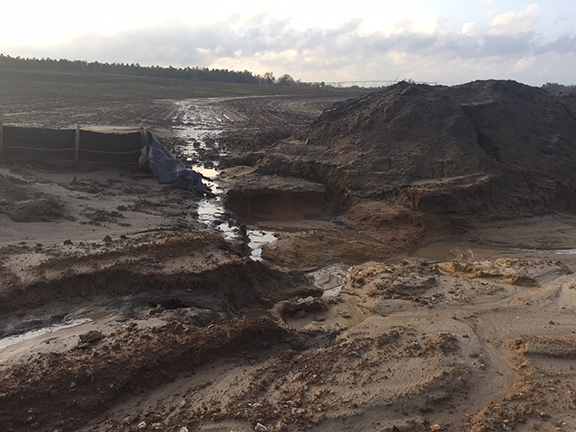
The 515 miles of the Sabal Trail Pipeline have not been without much controversy – from environmentalists, organized protests, social media campaigns, and has even resulted in a few isolated arrests. The pipeline construction nears completion in it’s trek across Southwest Georgia, and the frenetic progress continues farther south into Florida, crossing over the invaluable Floridan Aquifer. The pipeline affects nine counties in Georgia, including Stewart, Webster, Lee, Dougherty, Mitchell, Colquitt, Lowndes and Brooks Counties.
There are many questions about the impact of this project on the environment, wetlands, and prized farmland in nine Georgia counties, including Stewart, Webster, Lee, Dougherty, Mitchell, Colquitt, Lowndes and Brooks Counties.
In late January, as the project was underway in Brooks County Georgia, heavy rains descended on the farm of Randy Dowdy, a world record holder and National Winner in Soybean and Corn production. Despite reassurances from Sabal Pipeline management (Sabal Trail Transmission) and binding right of way agreements, that all efforts would be utilized to protect and restore Dowdy’s property to preconstruction status, those promises seem to have fallen very short of expectations. Dowdy’s farm was left in what could be categorized as devastation, especially as it relates to farming potential.
Dowdy’s farm sits on a particularly sloping hill, which has required a system of 12 terraces to minimize erosion, to protect the valuable topsoil that has produced world record and national award winning yields. “Those terraces are absolutely necessary to best management practices and stewardship of the land. I conveyed the terrace importance to the pipeline contractors and management repeatedly during the construction process” Dowdy stated.
As the terraces were breached, and in some cases, almost totally eliminated, the rains fell, and farmland and topsoil that had been vital in producing world record yields, washed into the lower wetlands and bottomlands of Dowdy’s property.
“I am literally sick to my stomach when I look at my farm. The sad thing is that I think most, if not almost all, of the damage could have been prevented if the proper measures had been taken prior to the storm” Dowdy continued. “Instead of planting my farm this spring, we are buying and hauling topsoil (an estimated 1400 plus dump truck loads,) in an effort to begin the restoration process. The most disappointing thing is Sabal and their contractors were notified 5 to 6 weeks prior to this rain event, that erosion was already occurring. They did nothing to prevent further erosion or have redundancy should their erosion control measures fail, which they did fail, and quite miserably. ”
It is an expensive and long restoration process, and according to many experts, could take decades.
Sabal representatives maintain that measures were in place that met Federal and State requirements regarding storm water, erosion, and sediment control plans that meet Best Management Practices and have warranted that each property will be restored to its previous condition and contours.
“Sabal and its contractors failed to install sufficient Best Management Practice measures. It’s one thing to segregate topsoil in its removal but that is only effective when that topsoil is replaced properly during reconstruction. The project inspectors that should have been responsible for proper preventative measures to avert these problems and responsible for the restoration/reconstruction process are employees of the pipeline contractor, so whose best interest did they have in mind?” Dowdy asked.
Beyond the immediate and obvious damage to Dowdy’s farm, there are many other unanswered questions as to the long term effects on the environment. The displacement of a foot to two feet of topsoil to the hardwood bottoms and wetlands will have long term effects on vegetation, trees, wildlife, and has been categorized as “pollution” according to the Clean Water Act of 1972.
The Environmental Protection Agency (EPA) is the Federal agency tasked with ensuring compliance, and in the State of Georgia, the Environmental Protection Division (EPD) is the state agency that is the State guardian of environmental compliance. The State of Georgia has a 400 page policy manual, called the Green Book, specifying minimum training and certification requirements for contractors and personnel that disturb ground more than one acre. Dowdy stated ” I sincerely doubt that the personnel on my farm met those standards at all times that dirt was being moved. Evidence to the contrary tells me that if pipeline personnel knew what was required, then they failed to do what was legally and properly required, for whatever reason(s). In the meantime, I am tasked with the labor, stress, time, expense, hassles, heartache and frustration.”
Which beg the following questions:
- Is this an isolated incident, confined only to one farm and one landowner in Brooks Co Ga?
- How attentive have State (EPD) and Federal (EPA) Agencies been to this three state project to insure compliance and to protect our fragile water supply and ecosystems?
- Was this project given exemptions from State and Federal agencies that would ease requirements of the Clean Water Act of 1972 and the Green Book?
“I am sure I am not the only landowner left with a mess. The crews are gone, they got the pipeline done on my farm. I am a small farmer left holding the bag and the expenses. Expenses that could have been prevented, if Sabal had responded to numerous requests to repair the terraces and put the proper best management practices in place, 5-6 weeks prior when they were notified of already occurring erosion problems.” Dowdy says.
Meanwhile, a S.W. Georgia farmer frantically works to get his farm restored while a large multi billion dollar corporation plods forward towards completion, leaving potential problems behind for some like Dowdy, and others that may be unsuspecting.
If the old proverb “A picture is worth a thousand words”, the accompanying photo gallery will speak volumes, even to the casual environmental steward.

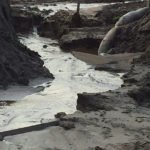

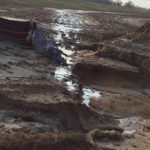
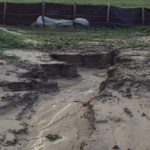
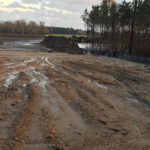
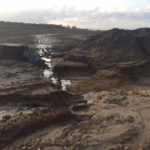
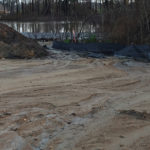
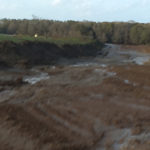
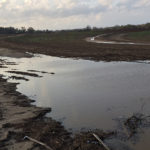
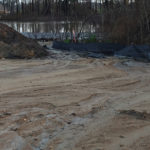
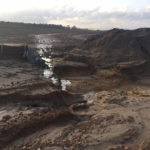
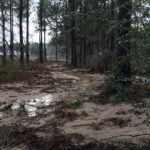
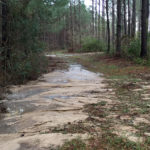
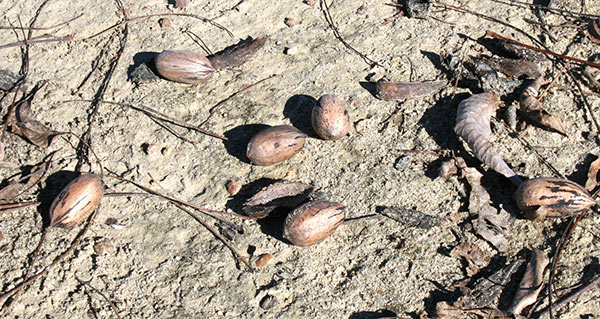


I am absolutely shocked and mortified by the photos…. These companies have no regard and feel NO responsibility for the devastation they have created. It’s appalling that there is no recourse…….. of course it’s not their lively hood and life … their only concern is the darn pipeline! Prayers … <3